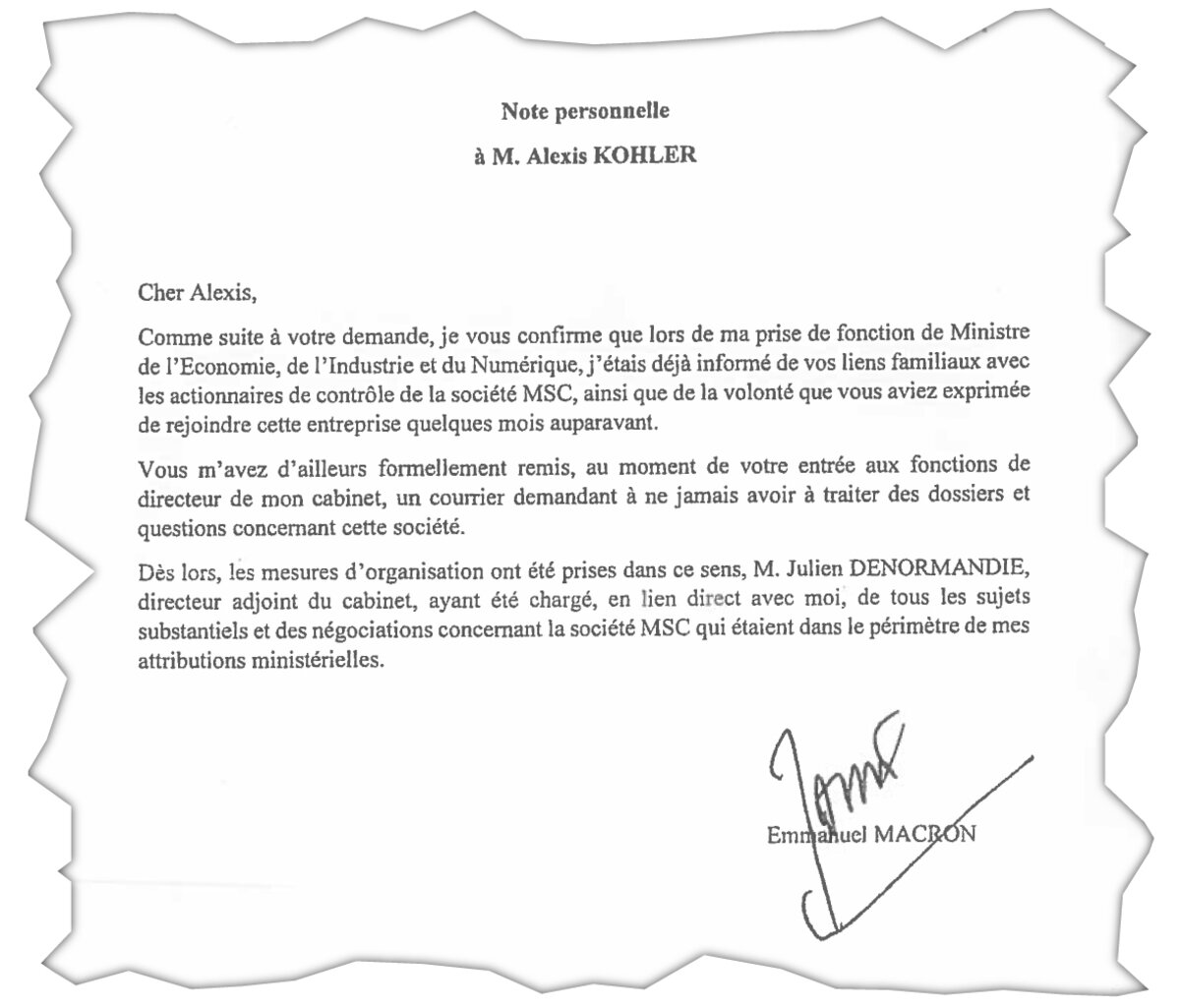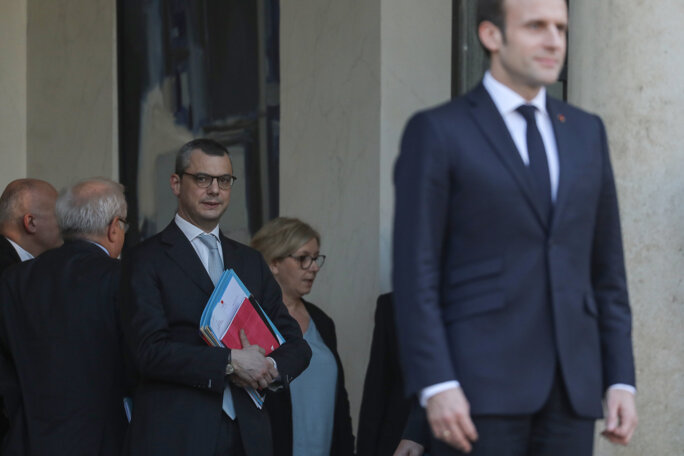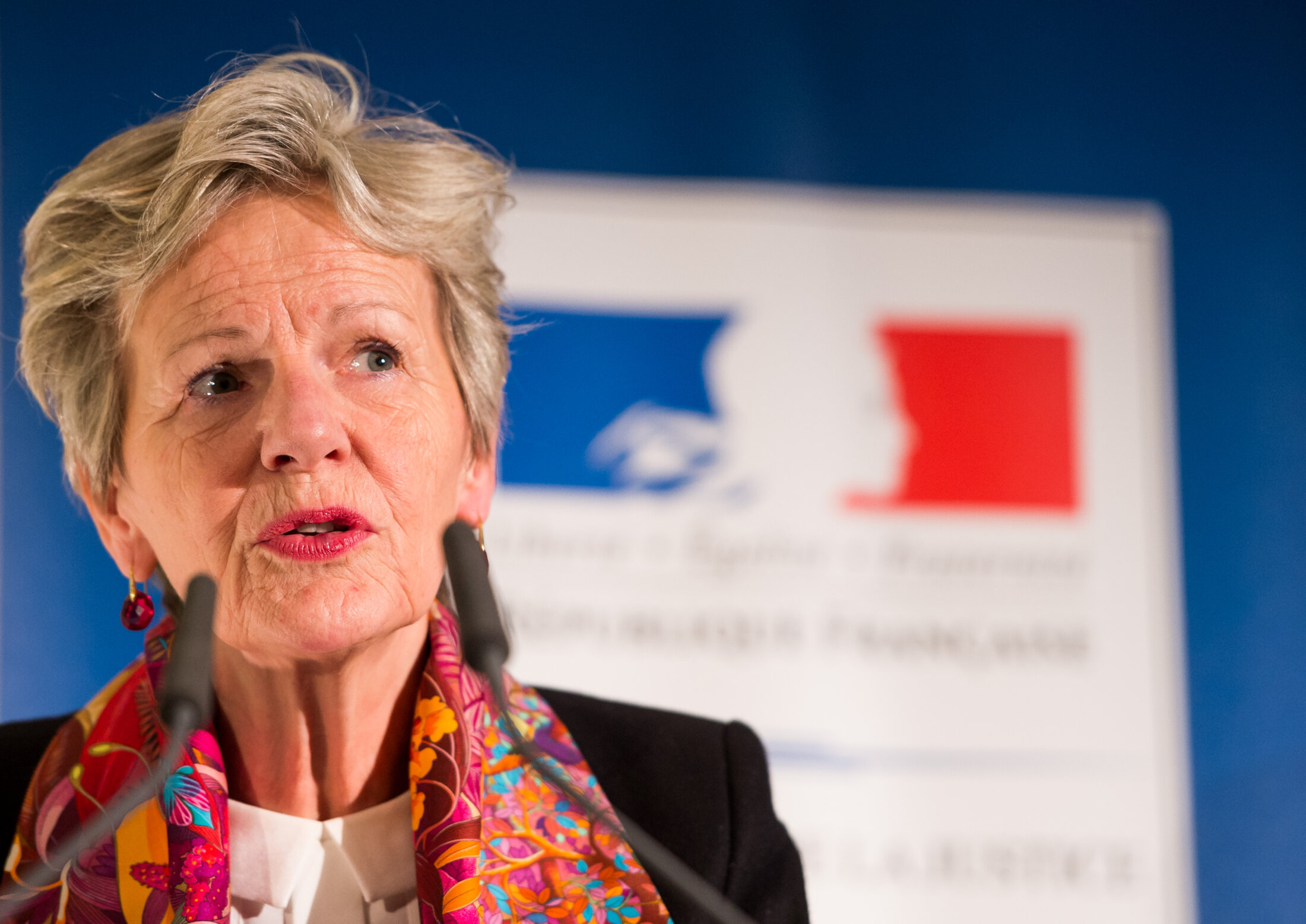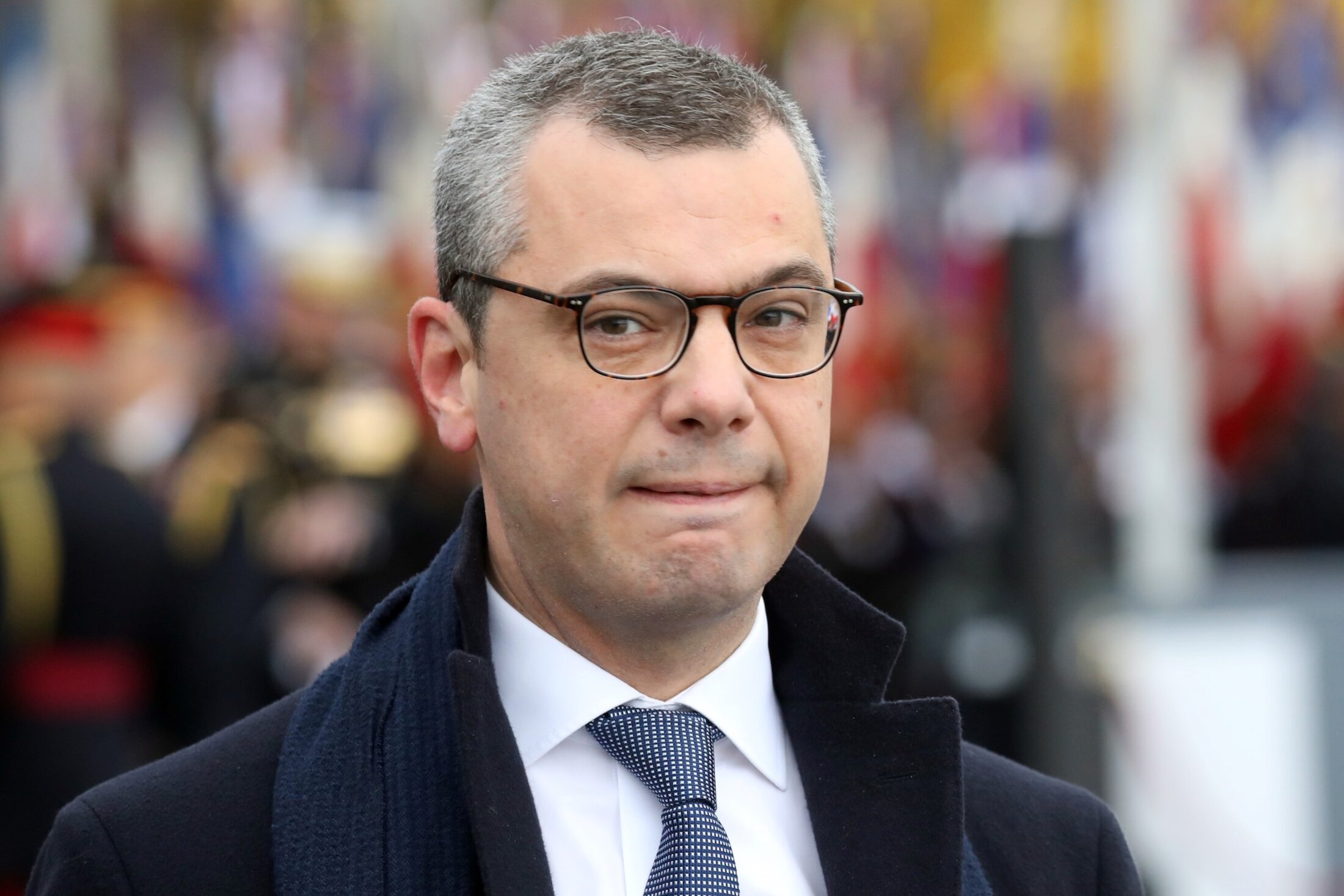President Emmanuel Macron intervened directly in legal proceedings to help his most senior aide and with apparent disregard for the separation of powers, Mediapart can reveal. The head of state wrote a letter seeking to absolve his chief of staff Alexis Kohler from wrongdoing in an alleged case of conflict of interest and collusion. Within weeks of the president's intervention the case against Kohler was dropped.
It is not the first time that Emmanuel Macron has felt himself unconstrained by the constitutional doctrine of the separation of powers, enshrined in article 16 of the 1789 Declaration of the Rights of Man and the Citizen. It has, as Mediapart's Ellen Salvi has pointed out, become almost a habit in his presidency. But on this occasion President Macron exceeded all the rules.
The facts are that a damning initial police report into allegations involving Alexis Kohler was written on June 7th 2019 while a second report, written by the same police officer but which said exactly the opposite of the first one, was signed off on July 18th 2019. In between those two events a signed statement from Emmanuel Macron had landed on the desk of the Parquet National Financier (PNF), the financial crimes prosecution unit which was overseeing the investigation.

Enlargement : Illustration 1

At the time Alexis Kohler, whose formal title is secretary general of the Élysée, had been facing a preliminary investigation by the PNF over alleged conflict of interest and collusion launched in June 2018. As Mediapart has revealed, Alexis Kohler had not made public his family links with the Aponte family, the major shareholder of the shipping line MSC.
This discreet maritime transport group depends a great deal on public subsidies and it was one of Alexis Kohler's many duties - he was also chief of staff to Macron when the latter was economy minister under President François Hollande - to determine the state's position in such cases. It was to exonerate his chief of staff from any fault over this that Emmanuel Macron wrote his statement.
It read:
Dear Alexis
In response to your request, I confirm that when I took over the duties of minister of the economy, industry and the digital economy I was already informed of your family links with MSC's controlling shareholders, as well as of the desire that you had expressed to join this business some months later.
You also formally handed me, at the time you started working as my chief of staff, a letter asking that you never have to deal with cases and issues concerning this company.
Organisational measures were then put in place to that end, with deputy chief of staff Mr Julien Denormandie taking charge, in direct contact with me, of all the substantive issues and negotiations concerning the MSC company which were within my ministerial remit.
The letter was signed by hand.
The head of state knew the use that his chief of staff was going to make of this note. It was going to be sent directly to the Parquet National Financier (PNF) to help Kohler in the investigation he was facing.
This statement from the president was supposed to remain unknown to all except the two or three people to whom it was aimed. It was not even listed in the official dossier of the case. And apart from a brief mention as an aside, no reference was made to it in the investigation report. It was supposed to have disappeared. But it still exists – Mediapart has got hold of it – and it raises huge issues over the workings of the justice system.
“The way certain procedures have been conducted means one cannot discount the suspicion of unlawful interference by the government in individual cases,” declared Élise Van Beneden, deputy secretary general of the anti-corruption organisation Anticor on May 20th 2020, speaking to the Parliamentary investigation into barriers to justice, when she was asked about the potential obstacles to justice that she knew about. She then explicitly revealed the existence of this letter.
Having failed in their first legal action over the Kohler affair, Anticor launched fresh legal action, directly before the senior presiding investigating judge, over “conflict of interest”, the “non-respect of ethical codes” and “influence peddling”.
Then in the National Assembly on June 23rd the Member of Parliament Ugo Bernalicis, from the radical left La France Insoumise party, questioned the justice minister Nicole Belloubet as to whether she had been informed of the direct intervention by the Élysée in the investigation into Alexis Kohler. “Are you ready to open an investigation by the Inspection Générale de la Justice?” he asked, referring to the watchdog that is intended to help ensure the independence of the judicial system. He received an embarrassed reply in response from Nicole Belloubet.
When asked about the reasons that led Emmanuel Macron to write such a note, and about the risks that it might represent to the separation of powers, the Élysée told Mediapart that it would be making “no response” to our questions. Alexis Kohler's legal counsel Éric Dezeuze, to whom we posed the same questions, had not responded by the time this article was published.

Enlargement : Illustration 2

In essence this note by the president was a key part of an operation to clear the name of the Élysée's secretary general and bury the case as quickly as possible.
The initial report on the progress of the investigation was written on June 7th 2019 by a police superintendent from the Brigade de la Répression de la Délinquance Économique (BRDE) fraud squad which was in charge of the investigation. It was an absolutely damning report as far as Alexis Kohler was concerned. It highlighted the facts, lies and failings of the top civil servant who for more than ten years had completely ignored the notion of a conflict of interests and the risks of collusion.
But a second report, which claimed to be definitive, was written on July 18th 2019 by the same senior detective. It had been reduced in size by a good ten or so pages from the first one; and all the troubling details in relation to Alexis Kohler had been removed. This new report cleared the Élysée general secretary of everything, insisting he had operated in “good faith”. This enabled the deputy prosecutor at the PNF, Jean-Luc Blachon, to drop the preliminary investigation on August 21st 2019, a move which came as a relief both for Alexis Kohler and the Élysée as a whole.
Meanwhile on July 8th 2019 – between the writing of the two reports - Jean-Luc Blachon had been officially appointed as deputy prosecutor at the PNF. When asked about this the prosecution service told Mediapart that “in May 2019 the judicial services department of the Ministry of Justice proposed the nomination of Mr Jean-Luc Blachon to the position of deputy prosecutor, after approval from the [magistrates council] Conseil Supérieur de la Magistrature.”
Power vacuum at the top of the financial crimes prosecution unit
Even though he may not have shown it, Macron's chief of staff had been completely obsessed by this case since the first revelations of his family links with the Aponte family – sole shareholders in MSC – in 2018. More revelations then followed: having spent several years in a row on holiday with the Aponte family, in particular on their yacht Radial off the coast of Croatia at the start of the 2010s, Alexis Kohler joined the maritime group as financial director between November 2016 and April 2017. In doing so he almost doubled the pay he had previously received as chief of staff to Emmanuel Macron, who was then a minister under President Hollande. During those seven months Kohler earned an average of 28,000 euros a month at MSC.
The reason that Alexi's Kohler's family links with the Aponte family raises questions is that MSC is a group that relies a great deal on public money. It is the main customer of the shipbuilders Chantiers Navals de l’Atlantique (previously STX France) in which the French state has a stake, and MSC has got used to determining all its new ship orders and port activity in France on the basis that the French state grants it credit facilities and financing.
In an email in April 2013 the finance director of STX, as it then was, summed up MSC's demands when it came to the state: “...To have access to public liquidity for as long as possible” with no constraints or conditions. In other words, MSC wanted the state to rubber stamp subsidies and financing. That amounted to billions for each order made to the Chantiers Navals de l’Atlantique shipyard.
Yet from 2008 Alexis Kohler was in a position where he could give advice and take decisions concerning MSC. First of all this was in his role as head of office then assistant director at the Agence des Participations de l’État (APE), which manages the French state's holdings in publicly-owned or part-owned firms. In this role he sat on the management boards of both STX France and the port of Le Havre in northern France. Then he became deputy chief of staff to finance minister Pierre Moscovici and later chief of staff to Emmanuel Macron, the minister for the economy. As dozens of emails show, STX France was often at the top of the in-tray when it came to pressing issues that the finance and economy ministers had to deal with.
This shows how dangerous the PNF investigation was for Alexis Kohler. The case worried the upper echelons of the Élysée where there was alarm about what might be happening at the PNF. Detectives investigating the case carried out searches at the Ministries of Economy and Finance, at the APE, at the ethics commission dealing with public officials and at the port of Le Havre, and numerous documents and emails were seized.

Enlargement : Illustration 3

Was the Élysée informed about the damning investigation report that had been written about Alexis Kohler? After the delivery of the first report the PNF's chief prosecutor Éliane Houlette did not take any action. As she was officially leaving as head of the PNF on June 30th 2019, Houlette decided not to open a full judicial investigation into the affair and instead left this “sensitive” case for her successor to deal with.
But at this point her successor had still not been appointed. And the executive seems to have counted on this power vacuum at the PNF, a period in which it was run by two assistant public prosecutors on secondment from the prosecution service in Paris, then by two deputy prosecutors at the PNF itself, to bury this embarrassing case discreetly and quickly. This situation also allowed Jean-François Bohnert, who was officially appointed head of the PNF on October 9th 2019, to start his new job without several difficult cases on his books.
A commando-style operation was thus launched over the space of just a few weeks to extract Alexis Kohler from the clutches of the legal system. Though Kohler's lawyer, Éric Dezeuze, had sent practically no items of evidence to the investigators since the autumn of 2018, in May 2019 he quickly sprang into action. He sent official statement after official statement from former bosses and colleagues of Alexis Kohler. All stated that Kohler had always informed them of his family links with the family shareholders behind MSC and that he had always been careful to recuse himself as soon as the issue was raised in any way.
So on May 13th 2019 a statement came from Rémy Rioux, Alexis Kohler's former boss first at the APE, then in Pierre Moscovici's private office. He had already signed two statements backing his former colleague for the ethics commission that deals with public appointments. On May 21st it was the turn of Amélie Verdier, former deputy chief of staff to budget minister Jérôme Cahuzac, then Pierre Moscovici, to send a character statement. Then Julien Denormandie, former advisor to Moscovici, later deputy chief of staff to Macron and now a junior government minister in charge of urban policy, gave his backing. He stated that when working with Kohler he, Denormandie, was the only person to handle matters involving MSC. Like the others he insisted that he was perfectly aware of the links between Alexis Kohler and the Aponte family, and that Kohler had always recused himself in order to avoid any conflict of interest.
On June 17th 2019 even Pierre Moscovici, who had never given a statement about Alexis Kohler to the the ethics commission, and had delegated that task to his chief of staff Rémy Rioux, sent in a character statement on behalf of Macron's chief of staff. He was followed on June 28th by Jean-Dominique Comolli, the APE's director from 2010 to 2012, who had also not signed any statement backing Alexis Kohler until that time.
Then on July 1st 2019 came the big move. The day before, Éliane Houlette had stepped down as head of the PNF. The very next day Emmanuel Macron himself signed a statement backing Alexis Kohler. It was sent by Kohler's lawyer to the deputy prosecutor at the PNF at the same time as the statement from Dominique Comolli. This allowed the president's statement to arrive among other documents, making it look as if it were just another statement among many others. Officially there was no pressure exerted by the Élysée.
When he quit as minister of the economy in August 2016, Macron had already written a statement of support to the ethics commission in relation to his chief of staff. In that first statement he was careful not to mention the family links between Alexis Kohler and the Aponte family. Emmanuel Macron's support was decisive in getting the green light from the ethics commission, as that body's chairperson has subsequently admitted. So why was a second statement written? Why was not the first one simply forwarded to be added to the file? The Élysée said it would make “no response” on this matter.
Even though the 2019 statement was not written on Élysée-headed notepaper, Emmanuel Macron and Alexis Kohler must have been fully aware of its significance. And that is, doubtless, what they were hoping for. In any case, matters started to move quickly from the moment this statement arrived at the PNF.
On July 7th 2019 Alexis Kohler was summonsed by detectives from the BRDE fraud squad. He referred to this note from the president during questioning. On several occasions he stated he had done nothing wrong, had done nothing unlawful, and that he had always abided by the rules, and that he had never been in a situation of a conflict of interest as he had always informed his bosses of his family ties.
However, Alexis Kohler appeared impatient as the questions kept coming about whether he had declared his family links. When his position in Emmanuel Macron's office was brought up, he said that he had sent a letter to the minister in September 2014 to inform him of the situation. At this point he also brought up the name of the president. “In doing so, I conformed to the legal arrangements in force, as confirmed by the personal note of Emmanuel Macron dated July 1st 2019 that my [legal] counsel sent to the assistant prosecutor [for financial crimes],” Kohler told the investigators.
A tale of two reports
When the secretary general of the Élysée directly mentions both the Élysée and his legal hierarchy to a detective, what is likely to happen? In this case the investigation was taken apart, step by step, and the conclusions were completely changed.
In the first police report, written on June 7th 2019, the senior detective concludes with these points: “His knowledge of his conflict of interest is proven by his email indicating to Rémy Rioux [editor's note, with whom Alexis Kohler had worked for years, first at the APE and then in Pierre Moscovici's office] that he had a conflict of interest … He did not declare his family ties in his declaration of interests of January 2014.”
But, says the report, though he knew he faced a conflict of interests, when he joined the offices of Pierre Mocovici and Emmanuel Macron, Kohler acted as if nothing was wrong. It states: “He takes no measures to organise a formal recusal on all questions touching on MSC. On the contrary, he receives APE and Treasury reports on cruise ship contracts and on the problems of financial guarantees, both for STX and MSC. The advisor to the [ministerial] office [editor's note, Julien Denormandie] who deals especially with STX includes him in email discussions.”
The police report continues: “In the decision-making process, his position as chief of staff leads to him overseeing the work of the APE and the Treasury and technical advisors, and to give advice to the advisors and to the minister.”
The investigation report's conclusion is a deadly one for Alexis Kohler; that he did nothing to give advance warning about his conflict of interest and the suspicions of collusion. “When he took up his post the commissioner at the ethics commission advised him to organise an official recusal on issues concerning MSC. Yet he put nothing in place … Nothing demonstrates at this stage of the proceedings that Alexis Kohler might not have overseen or given opinions on transactions involving STX and MSC. All the information passed up to him.”

Enlargement : Illustration 4

Within barely a month the same detective had changed his mind and completely changed tack in his second report. There was now no longer any question of Kohler having concealed his family ties with the Aponte family, of any absence of disclosure in his declarations of interest, of his conflicts of interest in his different posts, of the fact that he had not recused himself, or any mention of the fact that nothing proved that he might not have given his opinion on MSC matters. In the second report of July 18th 2019 – which was presented as definitive – all the awkward facts and all the questions had simply disappeared. In its view, Alexis Kohler had behaved in exemplary fashion from start to finish.
The second report thus concluded that when Kohler was at the APE and was an administrator at both STX and the port of Le Havre, his situation was perfectly aboveboard. “Alexis Kohler has never concealed his family ties and has indicated it on several occasions verbally and in writing to his line manager and his closest co-worker … He had asked to be replaced as administrator at STX but stayed in position as state representative after a decision by bosses at APE and then by the minister. His votes on the board at STX and GPMH [editor's note, Grand Port Maritime du Havre] which could have involved one of the companies had been carried out on the instructions of the minister. The many professional and personal emails from this period attest to his good faith,” the second report says.
In the same way, when he was appointed deputy chief of staff to Pierre Moscovici, the second report states: “When taking up his post Alexis Kohler had informed the minister and his chief of staff of his family links. A recusal was organised for when cases relating to MSC were considered. The organisation of the office made him the recipient of all reports, to keep him informed, in particular those from the DGT [editor's note, the Treasury] and the APE, as well as emails concerning STX and some reports on transactions involving MSC. This explains the many documents discovered and made use of. The emails and the reports analysed confirm that Alexis Kohler had not given an opinion or suggested a decision in the APE or DGT reports.”
Finally, the second report concludes that Alexis Kohler's attitude was just as respectful of the ethical rules when he was Emmanuel Macron's chief of staff. “Alexis Kohler had informed the minister of his family links when he took up his duties,” it states. “He had sent a letter to the minister in September 2014 explaining that he would recuse himself from all cases relating to MSC. The deputy chief of staff would thus deal with these cases. The organisation of the office made him the recipient, to keep him informed, of reports from the DGT and APE, as well as some emails concerning the company STX. It was part of his duties to approve and organise the appointments and meetings for the minister, through liaising with the latter. The STX France dossier focussed on major economic and strategic issues. Dealing with this case and giving opinions that came under the remit of his position but which concerned the recapitalisation of this company, as soon as he knew of MSC's intention to become a shareholder in September 2015, he had stopped dealing with it.”
Faced with such a final report, which had been completely re-written, the deputy prosecutor at the PFN, Jean-Luc Blachon, the only prosecutor handling the case, had no difficulty in deciding to drop the case on August 21st 2019. Who approved this decision to drop the case? The prosecution service told Mediapart that the assistant prosecutors who were temporarily in charge had not “asked for the writing of a second summary report, the latter having been updated by the investigators at the end of their investigations”. It explained: “The decision to drop the case was taken by the magistrate [editor's note, the prosecutor] in charge of the investigation at the PNF after a legal analysis, about which the prosecution service did not make any observations.” The end of the investigation was announced via an official statement.
But several months passed before the reasons for the decision to drop the case were known. Alluding to the time lapse of some of the facts that could constitute a potential conflict of interests, the prosecutor considered that nothing showed that Alexis Kohler had “the intention of gaining an interest”. The prosecutor's report stated: “Even though the investigation was opened before the prescribed time limitation, which is set at twelve years for hidden and concealed offences, the investigation was not able to establish that Alexis Kohler had deliberately carried out operations seeking to stop the discovery or revelation of his family ties with the Aponte family.” It therefore reached the conclusion that the offence of collusion or of the practice of “revolving doors” - in which top civil servants walk straight into a job in the private sector - did not exist.
At the time, some experts in public law had been surprised at the PNF's decision, given the apparent mass of facts against Alexis Kohler. “If this kind of case does not merit an investigating judge [editor's note, therefore an independent investigation], then it means the ethics codes and commissions serve no use, that by its very nature there is no conflict of interest in public service,” said one senior civil servant at the time. The answer to their questions about this inexplicable dropping of the case is now known: a 'magic' letter from the Élysée arrived and wiped everything away .
-------------------------
If you have information of public interest you would like to pass on to Mediapart for investigation you can contact us at this email address: enquete@mediapart.fr. If you wish to send us documents for our scrutiny via our highly secure platform please go to https://www.frenchleaks.fr/ which is presented in both English and French.
-------------------------
- The French version of this article can be found here.
English version by Michael Streeter



